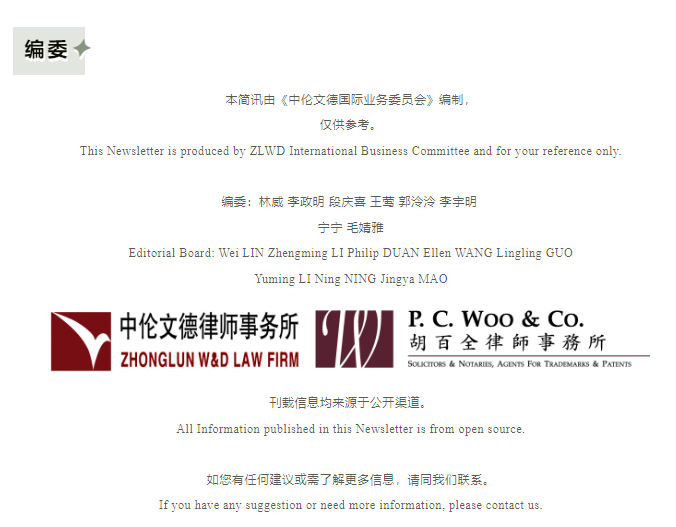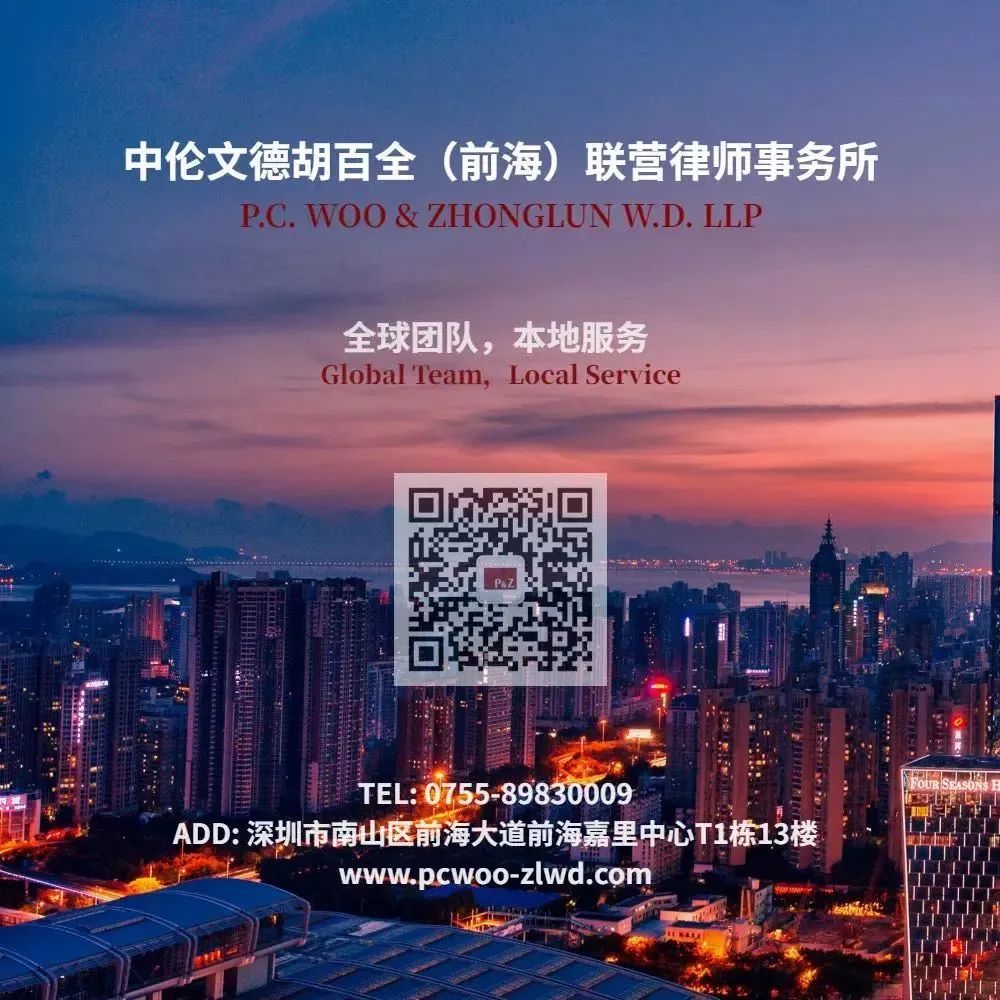
NEWS

NEWS
以下文章来源于中伦文德律师事务所 ,作者ZLWD

China-Latin America International Arbitration Forum Held in Beijing
On 30 May 2023, the China-Latin America International Arbitration Forum, organized by the China International Economic and Trade Arbitration Commission (hereinafter referred to as "CIETAC"), was successfully held in Beijing. The Forum aimed to build a platform for exchange and cooperation and to further develop the important role of the rule of law in promoting cooperation between China and Latin America. The Forum received strong support from 10 arbitration institutions and international organizations from Latin America and Spain.
With the theme of "Opportunities and Development of China-Latin America Arbitration in the New Era", more than 10 Chinese and foreign experts gave keynote speeches on "The Legal System of China-Latin America Arbitration", and had in-depth discussions on the introduction of dispute resolution systems in Latin American countries, the recognition and enforcement of arbitral awards in Latin America, the new trends in Chinese arbitration to promote quality dispute resolution in China and Latin America, and how to overcome legal and cultural differences to promote cooperation in the field of dispute resolution in China and Latin America on CIETAC. A round-table discussion on "Arbitration and Economic and Trade Development in China and Latin America" was held to share and exchange views on the role of arbitration in promoting economic and trade development in China and Latin America, how enterprises can regulate the use of dispute resolution clauses to prevent legal risks, and the beneficial help of the sound economic development trend of China and Latin America to the diversified dispute resolution mechanism.
China Maritime Arbitration Commission Releases Guidelines for Case Handlers and Secretaries of Arbitral Tribunals
On 16 June 2023, the China Maritime Arbitration Commission (hereinafter referred to as the "CMAC") officially released the "Results and Prospects of the First Anniversary of the Implementation of the China Maritime Arbitration Commission Arbitration Rules" (hereinafter referred to as the "First Anniversary Report"), the "Guidelines for Case Handlers of the China Maritime Arbitration Commission" (hereinafter referred to as the "Guidelines for Case Handlers") and the "Guidelines for Secretaries of the China Maritime Arbitration Commission Arbitral Tribunals" (hereinafter referred to as the "Guidelines for Secretaries of Arbitral Tribunals") at the 2023 China Maritime Commercial Arbitration High Level Dialogue.
In order to review the implementation of the 2021 Arbitration Rules in a timely manner and to summarise the experience, the CMAC has organised the First Anniversary Report to systematically sort out the overall situation of cases applying the 2021 Arbitration Rules, the handling of cases by arbitrators and the practice of the 8 first breakthrough provisions of the 2021 Arbitration Rules during the period from 1 October 2021 to 31 December 2022, to summarise the effectiveness and experience of the implementation of the and experience since its implementation, and share typical cases. It is of great practical importance to further promote the improvement of China's arbitration system, highlight the effectiveness of arbitration practice and focus on the image of China's arbitration in a high level of development.
In order to better regulate the management and professional assistance of case handlers and secretaries of arbitral tribunals at the operational level, and to provide reference for arbitration institutions in China, the CMAC has developed the Guidelines for Case Handlers and Secretaries of Arbitral Tribunals. The Guidelines for Case Handlers aim to standardise the case management of case handlers and improve the quality and efficiency of arbitration administration in arbitration institutions. The Guidelines for Secretaries of Arbitral Tribunals provide operational guidelines for the appointment of secretaries of arbitral tribunals in institutional or ad hoc arbitration cases and for the standardisation of the services of secretaries of arbitral tribunals.
Zhuhai Intermediate People's Court Releases White Paper on Judicial Review of Commercial Arbitration by Zhuhai Courts
On 24 May 2023, the Zhuhai Intermediate People's Court (hereinafter referred to as the "Zhuhai Intermediate Court") released the "White Paper on Judicial Review of Commercial Arbitration by Zhuhai Courts" (hereinafter referred to as the "White Paper"), which comprehensively summarises the basic situation and characteristics of the judicial review of commercial arbitration cases in Zhuhai courts from 2020 to 2022.
According to the White Paper, in the past three years, the Zhuhai Courts received 209 judicial review cases of various types of arbitration and concluded 202 cases; received 752 arbitration preservation cases, with a 100% preservation rate; The Zhuhai Intermediate Court received a total of 2,008 cases of enforcement of arbitral awards, with a total value of RMB 10.636 billion applied for. In the area of judicial review of commercial arbitration, the Court promoted the reform of "separation of arbitration, adjudication and trial" and jointly established a coordination mechanism between cross-border litigation and commercial arbitration; achieved the early unification of judicial review of commercial arbitration cases; strengthened trial guidance and supervision and unified the standards of arbitration awards; innovated the "Internet + judicial services" model and the coordinated layout of an intensive service system with "electronic service as the main mode of service, supplemented by other modes of service"; and the establishment of a mechanism for direct entrustment of service and access to evidence to provide judicial convenience to cross-border parties.
Beijing Fourth Intermediate People's Court:
Where the Arbitration Institution is Agreed to be "Party A's Registered Office or the Beijing Arbitration Commission", it is not An Unclear Agreement on the Arbitration Institution
Legal Basis:
Arbitration Law
Article 16
An arbitration agreement shall include arbitral clauses stipulated in the contract and other written agreements which request arbitration to be made prior to or following the occurrence of a dispute.
An arbitration agreement shall include the following:
(1) the expression of an application for arbitration;
(2) items for arbitration;
(3) the chosen arbitration commission.
Case Description:
On 12 November 2020, Shanghai Qifan Cable Co., Ltd. (hereinafter referred to as "Qifan Company") and China Nuclear Industry 23 Construction Co., Ltd. (hereinafter referred to as "23 Construction Company") signed the Cable Procurement Contract for the Construction Project of Jinrui Science and Technology Innovation City Base in Jinta County, Jiuquan, Gansu Province (hereinafter referred to as the "Contract") with the number CNEC03030192000-CLHT-20-0027 "). Article 13 of the Contract stipulates that "Any dispute arising from the performance of this Contract shall be settled through negotiation between the parties, and if the negotiation fails or if one of the parties is unwilling to negotiate, the dispute shall be submitted to the arbitration commission at Party A's registered office or the Beijing Arbitration Commission."
On 22 March 2023, Qifan Company applied to the Beijing Fourth Intermediate People's Court (hereinafter referred to as the "Court") to confirm the validity of the arbitration agreement. Qifan Company argued that the arbitration clause was in accordance with the provisions of the Arbitration Law and should not be interpreted as "either litigation or arbitration", but should be understood as arbitration by the arbitration institution in Party A's registered office or by the Beijing Arbitration Commission; as there was no arbitration institution in Shunyi District, Beijing, where Party A was registered, the dispute arising from the contract should be arbitrated by the Beijing Arbitration Commission. The "Beijing Arbitration Commission" agreed in the contract is the same as the name of the existing arbitration institution, which is a clear agreement on the arbitration institution. In view of the above, the Court was requested to confirm the validity of the arbitration clause agreed in the Contract in accordance with the law.
23 Construction Company said that it agreed with the request and reasons for the application of Qifan Company to confirm the validity of the arbitration agreement. The arbitration institution should be the Beijing Arbitration Commission.
Court’s View:
It was found that the registered office of Party A of the contract was "Shunyi District, Beijing", and there was no arbitration institution in this district, so "Party A (23 Construction Company)'s registered office" could not point to a specific arbitration institution, and the clause agreed to " Beijing Arbitration Commission" is a clear agreement, so according to the arbitration clause can point to a clear and unique arbitration institution, so the arbitration clause does not have unclear arbitration institution agreement. At the same time, both Qifan Company and 23 Construction Company agreed that there was no arbitration institution in Shunyi District, Beijing, where 23 Construction Company was registered, and agreed that the arbitration institution agreed by both parties in the contract should be "Beijing Arbitration Commission". In conclusion, the arbitration clause in question did not violate Article 16 of the Arbitration Law of the People's Republic of China, and did not belong to the invalidity of the arbitration agreement as stipulated in Article 17 and Article 18 of the Arbitration Law of the People's Republic of China, so the Court supported the request of Qifan Company to confirm the validity of the arbitration clause in question. The arbitration institution agreed in the contract should be the "Beijing Arbitration Commission".
In conclusion, in accordance with Articles 16 and 20 of the Arbitration Law of the People's Republic of China, the Court ruled that the arbitration clause agreed in Article 13 of the Contract signed between Qifan Company and 23 Construction Company on 12 November 2020 was valid.
High Court of Hong Kong:
Grant Injunction against Arbitration
Case Description:
Xiamen Xinjingdi Group Co., Ltd. (i.e Xiamen Xinxinjingdi Real Estate Co., Ltd., hereinafter referred to as the "Xinjingdi Company") applied to the High Court of Hong Kong (hereinafter referred to as the "Court") to enforce a Mainland arbitral award made in October 2006 in order to continue to perform its agreement with Yu Jingxingye Co., Ltd. and Yu Jingxingye (Group) Co., Ltd. (hereinafter collectively referred to as "Yu Jing Company"). The case was appealed to the Court of Final Appeal and on 9 October 2020, the Court of Final Appeal formally dismissed the Yu Jing Company’s appeal and remitted the case to the Court for assessment of damages payable by the Yu Jing Company.
On 17 June 2022, Yu Jing Company filed a new application for arbitration with the China International Economic and Trade Arbitration Commission (hereinafter referred to as the "CIETAC") in the Mainland, requesting CIETAC to rule that the agreement had been terminated in accordance with the newly amended Article 580 of the Civil Code of the People's Republic of China in 2021. On 3 November 2022, Xinjingdi Company applied to the Court for an injunction under section 21L of the High Court Ordinance, Chapter 4 of the Laws of Hong Kong.
Court’s View:
In terms of the legal principles for an application for an injunction, the court noted that the claimant would need to prove, firstly, that allowing the arbitration to continue would be oppressive, vexatious or constitute an abuse of judicial process on the part of the claimant; and secondly, that an injunction would not be injustice to the claimant in the arbitration. Unless exceptional circumstances arise, the parties to an arbitration agreement should refer any dispute covered by the arbitration agreement to an arbitral tribunal. In this case, the Court found that Xinjingdi Company could clearly prove that the dispute in the new arbitration case was not within the scope of the arbitration clause under the agreement and that the Yu Jing Company's rights under the arbitration clause would not be infringed by the injunction against arbitration and granted Xinjingdi Company's application.
In summary, the High Court of Hong Kong granted the application for an injunction against arbitration by Xinjingdi Company on 18 May 2023.


